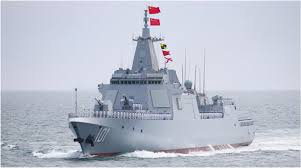Reading Into The G7’s Criticism Of China
By Chris Devonshire-Ellis
The G7 nations – Canada, France, Germany, Italy, Japan, the United Kingdom, and the United States, as well as the European Union, have been meeting in Hiroshima this past weekend, in addition to invited guests Brazil, India and Ukraine. Much of the discussions have centred on two points, the Ukraine conflict with Russia, and concerns over China’s growing economic strength. A reasonable, if somewhat critical summary is provided by the Financial Times here.
The G7 has issued a statement largely condemning China for several actions, which I discuss and provide some background on in this article.
These are the main issues:
Militarisation of the South China Sea

This is mainly related to Taiwan in the contemporary context, and the issue concerning its sovereign status. Most readers will be well aware of the issue, so I need not repeat the dispute here. However, the militarisation of the region has included US arms sales to Taiwan that included US$5.861 billion from 2020 under the Trump Presidency, and a further US$3.506 billion during the current Biden Presidency. That equates to a total spend of close to US$10 billion in the past three years.
With Taiwan so close to the Chinese mainland, it is fairly obvious that China will respond to its own security fears. As American media stated in 2020, the US has been pushing large arms sales to Taiwan, including jet missiles that can hit the Chinese mainland.
Essentially, the differences between the Chinese mainland and Taiwan are a Chinese issue to resolve, preferably by diplomatic means. But it should also be noted that the United States has not been pursuing a completely diplomatic approach either. Criticism of China in this regard should be balanced against a Western military build-up as well.
Meanwhile, the French President Macron has also taken a more pragmatic view and cautioned against driving a Taiwan policy that stated that France and the EU should not be drawn into a crisis over Taiwan driven by an “American rhythm and a Chinese overreaction.” In essence, he says the same thing: the Taiwan issue is a Chinese political and diplomatic concern and should not be inflamed by US weapons sales.
It is worth mentioning that the Taiwanese economy has entered a recession the past three months, partially due to the political tensions, while its main export partners – its largest customers – remain Hong Kong, followed by the Chinese mainland. Their collective trade with Taiwan is three times larger than Taiwan’s trade with the United States – and doesn’t include weapons.
Economic Coercion

This is reference to the Belt and Road Initiative and suggestions of China deliberately making countries beholden to it via ‘debt traps’. In fact that theory has long since been debunked, including by Western academic institutions such as the John Hopkins University and Chatham House. In our own research and observations over at Silk Road Briefing over the years, with hands-on experience, especially in Sri Lanka, we have also seen no evidence.
This doesn’t mean to say some loans have had problems, because they have. However, these have been due to unforeseen project delays due to Covid (interfering with project completion and expected cash-flow operational revenues) in addition to local corruption and poor management. In fact, the extent of China’s problematic BRI loans is within the norm in terms of financial risk management – and they are being managed.
On the other hand, China’s Overseas Direct Investment (ODI) was up 18% in Q1 2023 while its trade with BRI countries grew by 9.2% in the same quarter over the previous year. Clearly, the Belt and Road Initiative is not engaging in economic coercion.
However, the other side of the coin is that China ODI has been flowing into Asia rather than the West, which has been left to fund its own infrastructure needs, while China concentrates on emerging markets. There may be sour grapes at being left out.
Meanwhile the EU’s ‘Global Gateway’ and the G7’s own ‘Build Back Better World’ (B3W) competing funding schemes seem to have been extremely quiet of late.
The Global Gateway was supposed to raise some €300 billion of investments, of which some €18 billion appears to have been earmarked through the European Investment Bank. However, a look at the Global Gateway projects list appears to be more a menu of intentions, with no financing actually confirmed or projects yet underway.
Meanwhile, the best the B3W appears to have managed is raise just US$2 million. There is no ‘Build Back Better World’ website, nor has any Western financial institution identified any loans anywhere as having come from this initiative. Given that it was supposed to be worth US$60 billion, where has the money gone?
China meanwhile has spent some US$962 billion in cumulative BRI engagements, with about USD573 billion in construction contracts, and USD389 billion in non-financial investments. The G7’s arguments as concerns ‘economic coercion’ are old hat, and almost certainly designed to cover up their own shortcomings in terms of actually committing finance to global infrastructure needs while pointing the finger at China. If correct, this is unfair and devious.
Ukraine

The G7 also called on China to ‘do more’ to assist with solving the Ukraine crisis, criticizing it for not doing enough and calling on Beijing to persuade Russian President Putin to withdraw. Zhongnanhai’s response is relatively easy to imagine: that President Xi has already spoken with Ukrainian President Zelensky, that China already drew up a 12 Point Peace Plan that the West largely ignored, and that in terms of persuading Russian troops to leave Ukraine that the European Union has a 2,250km border with Russia and is rather closer to the problem. After all, China is 6,775km from Europe.
There are however some undercurrents here that bear examining. By putting pressure on China, is the G7 – which also invited India and Brazil to their summit – now concerned that they cannot engineer a Western win in Ukraine without involving contemporary non-participants? If so, this indicates things may not be going the way the West had envisaged. It also appears an attempt to widen the scope of the conflict and involve more countries.
One suspects that China will have nothing to do with such ideas.
Summary
It is apparent that all reasonable people wish for the conflict to end. However, there appear numerous views about how this should be achieved: continuing the war (apparently the US and EU position) or sitting down and negotiating a deal (Russia and everyone else). While the divide between not letting Russia be seen to have any negotiations on its behalf belies the Russian concerns that lead to the conflict in the first place, and continuing the war until a win is guaranteed seem as far apart as ever, China will not be drawn into a dispute that is essentially of the EUs own making.
However, political winds of change are starting to blow, and with numerous elections due, it may be another two years until European politics changes to usher in alternative views. There already appears to be differences between G7 China statements and actual intent. For example, UK Prime Minister Rishi Sunak, as part of the G7 was signatory to the China criticism paper – yet is set to backtrack on his election pledge to close all China’s Confucius Institutes in the UK. Taken forward, this indicates that what the G7 says may not be what they are capable of enacting.
The G7 meanwhile are unlikely to get any change out of Beijing. In fact, the reverse trends are true. US-China bilateral trade has declined 30% in the past seven months while EU-China trade has declined 18% in Q1.
China’s overall Q1 trade figures are slightly up though, suggesting the country is sourcing from alternative markets, a situation also borne out by the China-BRI trade figures having increased. What used to be European is now Latin American.
The takeaway from the whole G7-China affair, is that the G7 feel, rightly or wrongly, that they are in a position to inflict pressure upon China. The reality is that it is China, not the West, who is slowly decoupling its trade and political cooperation. The tables are being turned, and this has global implications. After all, the BRICS group alone has already overtaken the G7 in terms of global GDP. While the West might not like it, the influential, economic, and trade future is increasingly heading East. That has impact on where your future investments would be better located.
Chris Devonshire-Ellis is the Chairman of Dezan Shira & Associates. He may be contacted at asia@dezshira.com
Related Reading
- BRICS, EAEU & SCO To Discuss Integration At The Eurasian Economic Forum
- The New Candidate Countries For BRICS Expansion
About Us
China Briefing is written and produced by Dezan Shira & Associates. The practice assists foreign investors into China and has done so since 1992 through offices in Beijing, Tianjin, Dalian, Qingdao, Shanghai, Hangzhou, Ningbo, Suzhou, Guangzhou, Dongguan, Zhongshan, Shenzhen, and Hong Kong. Please contact the firm for assistance in China at china@dezshira.com.
Dezan Shira & Associates has offices in Vietnam, Indonesia, Singapore, United States, Germany, Italy, India, and Russia, in addition to our trade research facilities along the Belt & Road Initiative. We also have partner firms assisting foreign investors in The Philippines, Malaysia, Thailand, Bangladesh.
- Previous Article Record High Australian Exports to China Ignite Optimism for Bilateral Trade (Updated)
- Next Article Establishing an Online Presence in China – Webinar









